

Order a call
At the high-level event on May 12, 2021, the 2020 Regional Overview of Food Security and Nutrition in Europe and Central Asia, that is the sixth regional report monitoring trends and progress made towards reaching a given challenge.
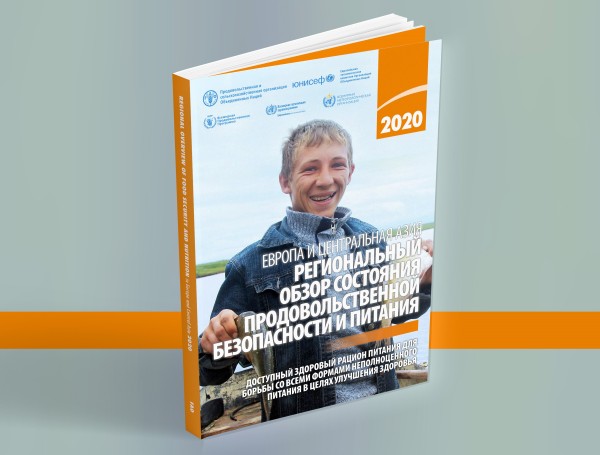
The special theme of this 2020 edition is the affordability of sustainable healthy diets and their usefulness in ending hunger and malnutrition in the region. The main focus of this report is a quantitative analysis of the cost and affordability of healthy diets at national and subnational levels.
The 2020 Regional Overview was jointly prepared by the six members of the Issue-based Coalition on Sustainable Food Systems for Europe and Central Asia: the Food and Agriculture Organization of the United Nations (FAO); the World Food Programme (WFP); the United Nations Economic Commission for Europe (UNECE); the United Nations Children’s Fund (UNICEF); the World Health Organization (WHO); and the World Meteorological Organization (WMO).
The report will be launched at a high-level event on Wednesday, 12 May, 10:00-11:30 a.m. (CEST)
The ceremony will be streamed live on YouTube in English and can also be followed on Zoom in English and Russian.
More http://newsletters.fao.org/q/122ItzGpbJDBByPXleiw/wv
April 15, 2021, a zoom conference was held between the National Chamber of Entrepreneurs of the Republic of Kazakhstan "Atameken" and the Codex Alimentarius Team of Kazakhstan. The main purpose of this meeting was the establishment of effective interaction and cooperation on the Codex Alimentarius issues. As result of the meeting was agreement on assistance in attracting industry unions (associations) and agribusiness entities to form a group of national experts and form national positions on the Codex Alimentarius documents. The importance of the training seminars on food quality and safety issues held by the Codex Alimentarius Team was noted.
Representatives of the department of technical regulation and the agro-industrial complex and food industry took part in the meeting from "Atameken".
A cycle of regional training webinars on food safety based on risk assessment (GHP, GMP, and HACCP) and Codex Alimentarius Standards has begun in the Republic of Kazakhstan.
Webinar was arranged by the Committee for Sanitary and Epidemiological Control of the Ministry of Health of the Republic of Kazakhstan (hereinafter - CSEC) jointly with the "National Center of Expertise" of CSEC of the Ministry of Health of the Republic of Kazakhstan and the Codex Alimentarius Group of Kazakhstan for representatives of the business operators of Kyzylorda region, Department of Sanitary and Epidemiological Control and the branch of the National Center for Expertise of Kyzylorda region.
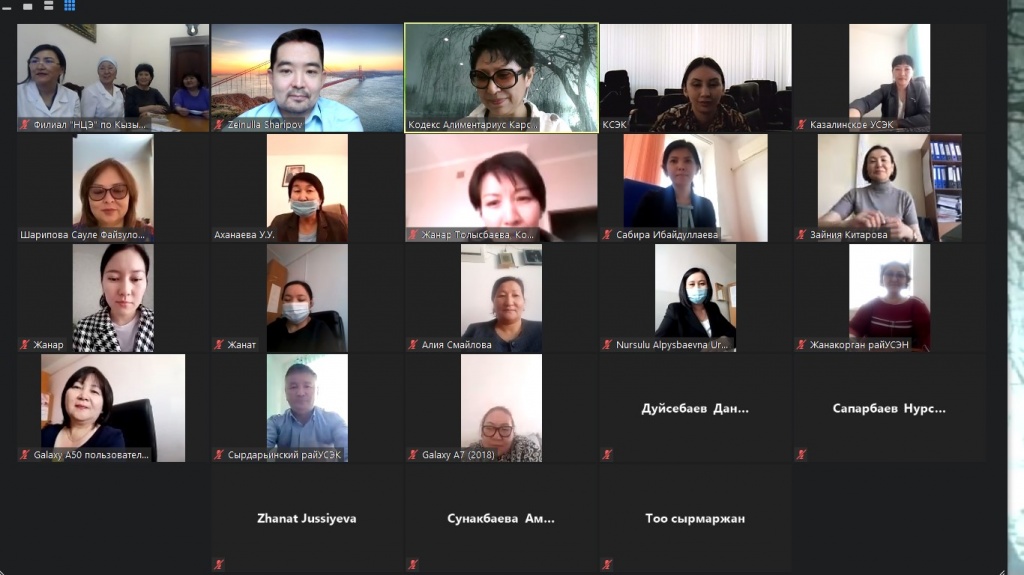
On the first day of the webinar, the role of the Codex Alimentarius Commission and a mission of Kazakhstan as a regional coordinator for Europe have been presented. The key topics of the Ad hoc Codex Intergovernmental Task Force on Antimicrobial Resistance were also highlighted. The trainers of the National Center for Expertise presented the issue of food poisonings in Kazakhstan and the possibility of conducting control based on risk analysis, prevention and control measures. The basics of GHP and GMP have been presented.
On April 8, 2021, the WHO Country Office Advisor for the Implementation of “One Health” principles presented the FAO/WHO Food Control System Assessment Tools. The experts of the Codex Alimentarius Group of Kazakhstan presented the issues of protecting the health of consumers and the interests of producers within the framework of the work of the subsidiary Committees of the Codex Alimentarius Commission. The Codex Alimentarius Committees on pesticide residues, residues of veterinary drugs in food, food import and export inspection and certification systems were also considered.
The final day of the webinar was devoted to food safety issues based on the implementation of HACCP system. The principles of hazard identification, assessment of chemical, microbiological and physical risks, the main technological processes of food production, the application of methods of control and risk management are considered. The principles of inspection and laboratory control based on risk assessment are outlined. An attention is paid to the importance of compliance with national and international requirements in food safety.
Webinar gave an opportunity, on a single platform, to discuss topical issues of food safety assurance together with the business community, inspectors and laboratory control specialists. The participants spoke about the benefits of such training webinars, which play a significant role in increasing the knowledge of business operators in food safety, and therefore, guaranteeing the food safety of manufactured products and strengthening the health of consumers.
WHO Regional Office for Europe jointly with Kazakhstan as the Regional Coordinator for Europe of Codex Alimentarius Commission held a zoom meeting with the Codex Alimentarius Team of the Republic of Uzbekistan on March, 26, 2021. The possibilities of strengthening for the Codex contact team of Uzbekistan were discussed. Establishing the National Steering Council on Codex Alimentarius and preparation a project proposal to the FAO / WHO Codex Trust Fund for national capacity building have been discussed as well.
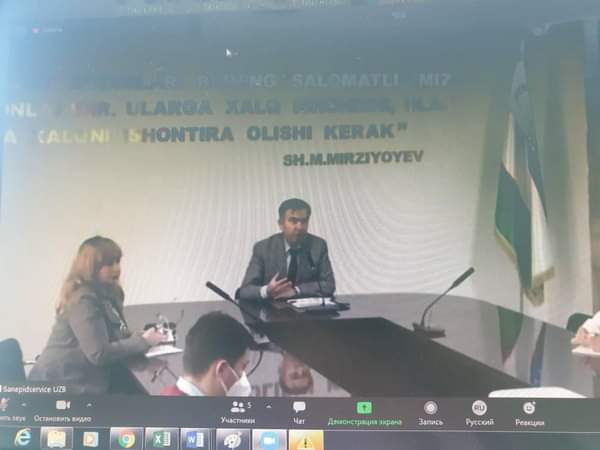
The WHO Regional Office for Europe, the WHO Country Office in the Republic of Uzbekistan, the Codex Contact Team from the Ministry of Health of the Republic of Uzbekistan, Kazakhstan Codex Alimentarius Team participated in this zoom meeting.
March, 8, 2021 International Women’s Day. Codex celebrates the women who take up the challenge to ensure food is safe
A third of the leadership of the Codex Alimentarius Commission are women, including Kazakhstan that heads the FAO / WHO Coordinating Committee for Europe. Women in the Codex family make significant contributions to ensure food safety and fair trade through the Codex Alimentarius standards.
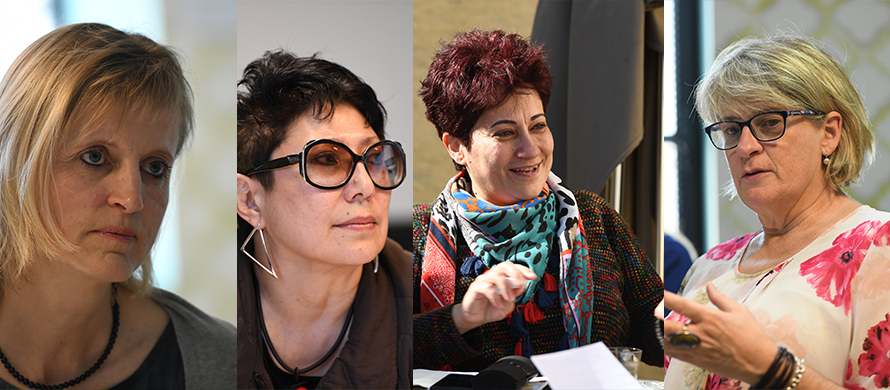
I overcome all challenges with a focus only on a positive outcome with full confidence in its implementation. Humor and irony are excellent helpers along the way.
Nailya Karsybekova, Chairperson FAO/WHO Coordinating Committee for Europe
February 2, 2021 Pre-session meeting with 52 countries of the European Region in preparation for the 32d session of the Codex on General Principles has been arranged. The Committee documents were discussed in the framework of the CCGP’32. Countries-members have been expressed the national positions on essential issues, doubts and concerns regarding the certain points of the procedural guidelines for committees working by correspondence. In general, such meetings help to better understand Codex documents from different points of view and to participate in the formation of regional positions on the Committee documents.
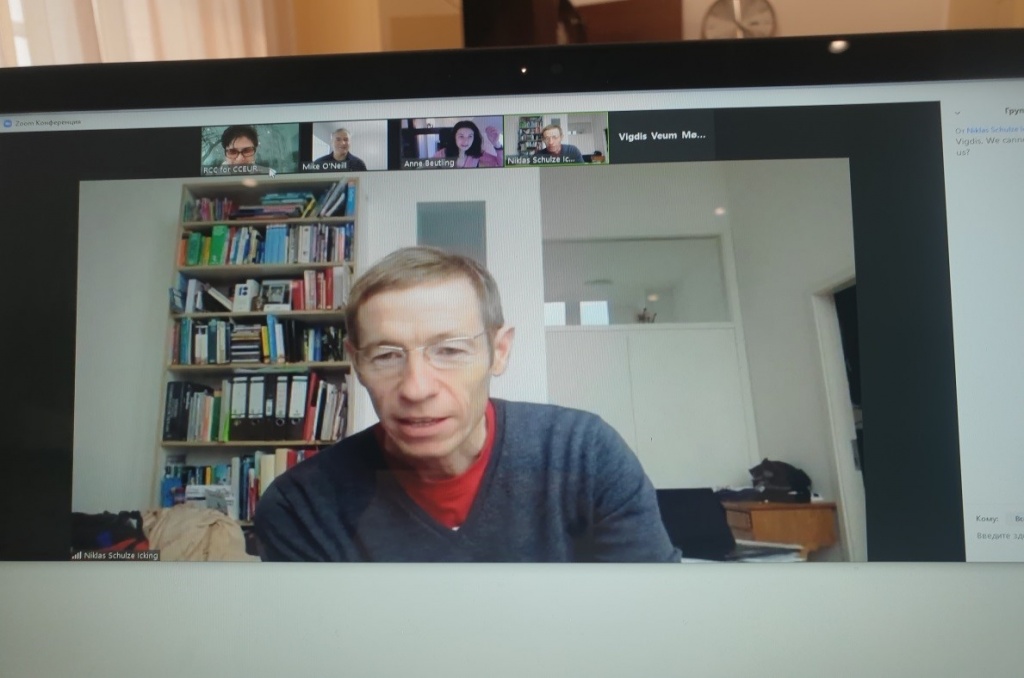
February 3, 2021 The zoom conference was held with the post-Soviet countries to clarify and discuss the main documents - the Strategic Plan 2020-2025 of the Codex Alimentarius Commission, the Communication Action Plan for the region for 2020-2021, as well as the results of the 80th session of the Executive Committee. The tasks of the member countries and activities to implement the strategic and communication plans, participation in the CCGP virtual session were discussed.
8-17 February 2021 The Codex Committee on General Principles (CCGP) is the first dedicated Codex body to be held virtually. The challenge for the Codex was to discuss the texts in detail at the development stage and to identify the opportunities and issues that delegates will face on working online: no pre-sessional informal meetings, social communication outside the plenary session, no chances to make new relationships, share ideas and understand different points of view.

At the same time, more than 300 delegates joined the CCGP session.
Committee’s Chairman Jean-Luc Ango from the French Ministry of Agriculture and Food emphasized that a consensus could be reached at the virtual committee meeting. This was especially reflected in the discussion on the need to find the right balance between the time for discussion and individual interventions.
Key issues at CCGP sessions included procedural guidance for committees working by correspondence, procedures for revising / amending Codex documents, and monitoring the use of Codex standards.
Head of Kazakhstan delegation, Nailya Karsybekova mentioned that the key role of policy decision makers on wide implementation of Codex documents at national level. Additionally role of FAO and WHO in promotion of Codex is huge in countries.
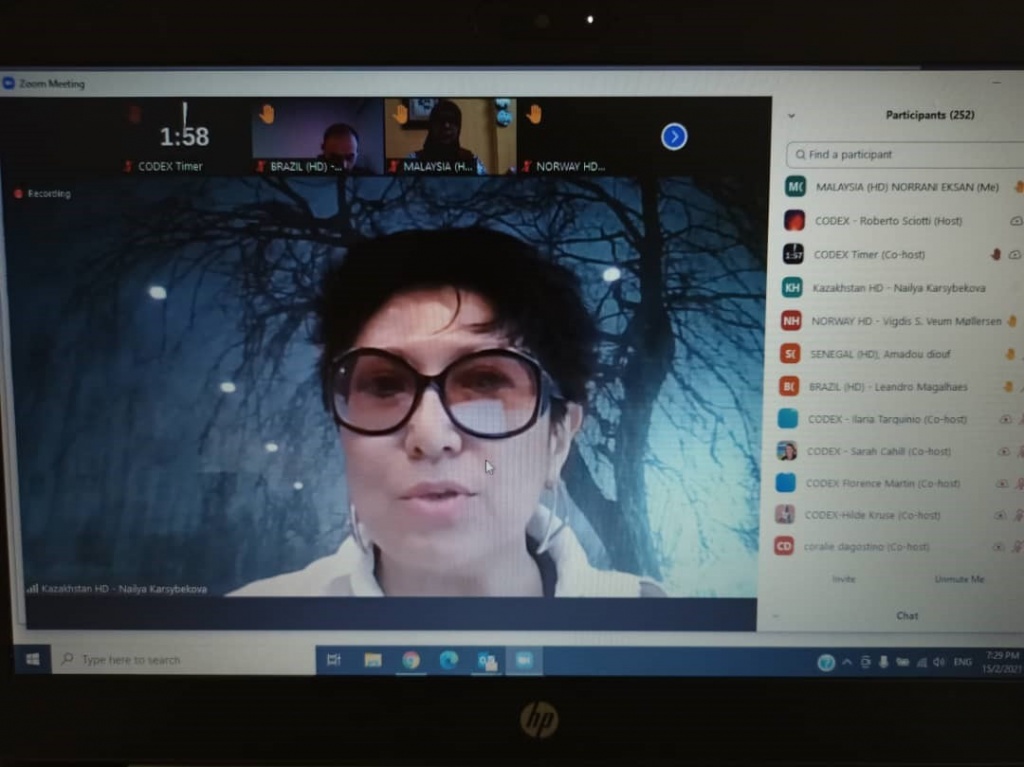
The Codex Secretariat noted that there was a record number of participants in the virtual mode of the Committee, therefore, the inclusiveness in the work of the CCGP is increasing.
February 26, 2021 Interagency Coordination Council on Codex Alimentarius was held. In connection with the pandemic, the work of most bodies and structures has changed. Thus, the work of the Interagency Coordination Council on Codex Alimentarius was temporarily suspended in 2020. It should be noted that the Republic of Kazakhstan became a grant holder of the Codex Trust Fund. The initiator and developer of the project proposal was the Kazakhstan Codex Alimentarius Team. The grant aims to build sustainable national capacity on Codex Alimentarius issues.
January 13-21, 2021 The 80th session of the Executive Committee (CCEXEC) has been passed. The CCEXEC worked for over two weeks as a virtual meeting and discussed strategy of activity during pandemic Covid-19 and issues related to the role of science. The session has been finished on January 21 2021.
Reports were made by the Subcommittee on the Implementation of the Strategic Plan 2020-2025, the Subcommittee on the Statement of Principles on the Role of Science, and the Subcommittee “Codex and Pandemic - Strategic Challenges and Opportunities” at the 80th CCEXEC session. The reports can be found here http://www.fao.org/fao-who-codexalimentarius/committees/executive-committee/meetings/ru/
The members of the CCEXEC discussed the possibilities of contributing to the work of the UN Food Systems Summit, which is scheduled for September 2021 in New York. FAO Food Systems Director Jamie Morrison said the Codex documents are as the gold standard for food safety regulations around the world.
January 22, 2021. A working meeting was held with Chairperson of the Codex Committee on General Principles of the Codex Alimentarius Commission (CCGP, France) Jean-Luc Anjot and his Assistant Louise Dange. The key documents submitted for discussion were considered on the meeting. The main focus was on principle issues such as the Procedural Guidelines for Committees working by Correspondence (CWBC) and Monitoring the Use of Codex Standards. As a whole both of these documents are strategic importance for the future work of the Commission.
The Procedural Guidelines for the CWBC went through 2 rounds of discussion in writing and found consensus on almost all points. In this session, the question arises about the possibility of virtual and/or hybrid meeting in situations where it is difficult to find a consensus and it is necessary to listen each other. This point requires an addition to the terms of reference of the CWBC, in this regard, the work of such committees may be delayed. Therefore, the issue requires a decision by the CCGP. The draft document on Monitoring the use of Codex standards is at the initial stages of discussion and has questions on the choice of monitoring methods and a mechanism for its implementation.
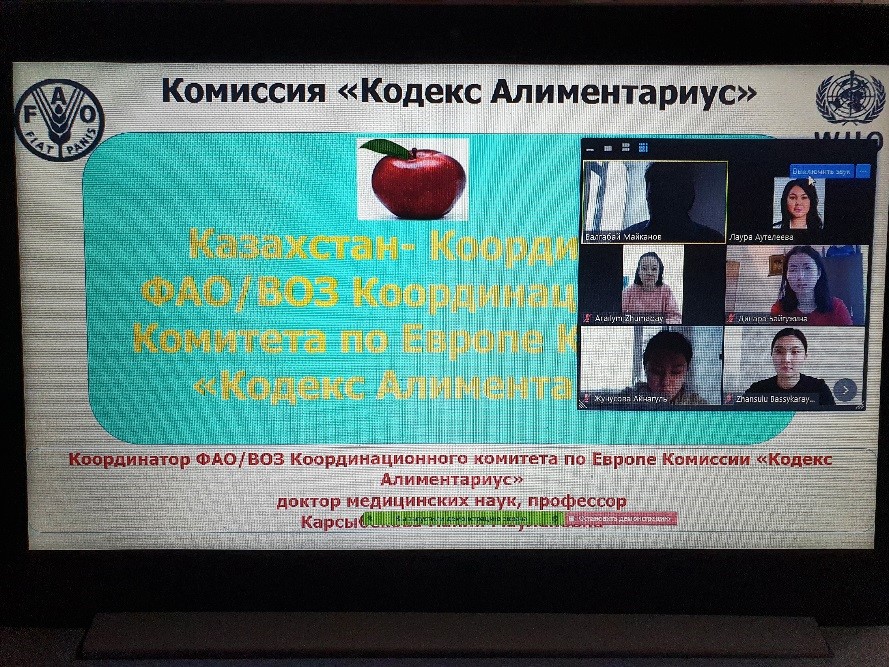
January, 25, 2021. Regional Coordinator of the FAO/WHO Coordinating Committee for Europe of the Codex Alimentarius Commission Nailya Karsybekova held a lecture on Codex Alimentarius for second-year undergraduates in the specialty "Veterinary Medicine" of the educational program "Safety and quality of food products" of the Department of "Veterinary Sanitation" of the Faculty of "Veterinary Medicine and Livestock Technology" of the "S. Seifullin Kazakh Agro Technical University". The presented material revealed such issues as the role, structure and approaches in the work of the Codex Alimentarius Commission, as well as the importance of Codex standards for ensuring food safety in the international market.
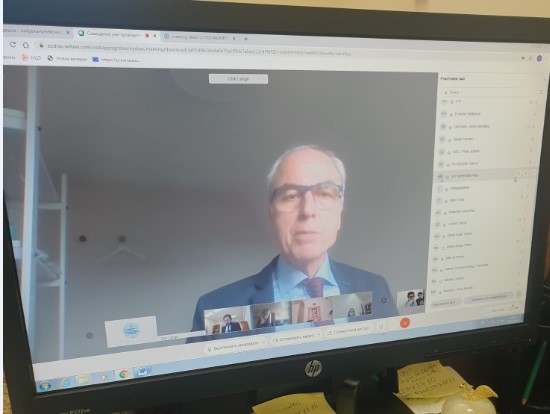
January, 28, 2021. A pre-session meeting of the Codex Committee on General Principles of the Codex Alimentarius Commission (CCGP) among the member countries of the European region was held under the chairmanship of the Republic of Kazakhstan. Regional Coordinator of the FAO/WHO Coordinating Committee for Europe of the Codex Alimentarius Commission Nailya Karsybekova proposed to discuss the documents of the CCGP agenda. This meeting is of strategic importance for the region, so that the national positions of the countries are announced and, on their basis, form a regional position that reflects the interests of the entire region, as well as without fundamentally infringing on the positions of the participants. It is important to understand how the discussion of the presented documents can proceed.
5th and 6th November 2020 – participated in the discussion and approval of the report of the 43rd session of the Codex Alimentarius Commission.
Within the Europe region:
- The FAO/WHO Coordinating Committee for Europe of the Codex Alimentarius Commission has officially approved Russian as an official working language.
- The Republic of Kazakhstan has been officially approved as the Regional Coordinator of the FAO/WHO Coordination Committee for Europe of the Codex Alimentarius Commission for a second term.
- Intergovernmental Task Force on MAR (TFAMR). Approved the conclusion proposed by the European Region – Approve the Code of practice to minimize and contain foodborne antimicrobial resistance (CXC 61-2005) in step 5. At TFAMR’8, the discussion on principles 5.7 of this document will be resumed.
- Sub – Committee of the Executive Committee of the Codex Alimentarius Commission Codex and the Pandemic – strategic challenges and opportunities. The final provisions of the CRD Comments of Members from the CCEURO region Agenda item 3 – Intermediate report of the CCEXEC Sub- Committee on Codex and the Pandemic – Strategic Challenges and Opportunity.
16th November 2020 Kazakhstan chaired a meeting with 52 European Union and its Member States, including the European Union. The meeting was held with technical support from the National eHealth Centre of the Ministry of Health of Kazakhstan.
The second round of the Codex Alimentarius Commission Executive Committee Sub-Committee Codex and the Pandemic - Strategic Challenges and Opportunities was discussed. As a result of active discussion among the members of the region, general answers have been formed, which reflect the position of the European region on holding virtual session, the list of criteria for a successful virtual session, the role of the Chair of the virtual session and many others. The summary, which included all comments from the member states of the European region, was presented to the Chairman of the Commission's Codex Alimentarius Subcommittee on Code and the Pandemic - Strategic Challenges and Opportunities, Ms. Maria Ade (Lebanon), for further work and to draft the final report, which will be presented at the virtual session of the Commission's Executive Committee Sub-Committee on Codex and the Pandemic - Strategic Challenges and Opportunities and the final format of the report to be presented at the 80th session of the Executive Committee, scheduled for January 2021.
23rd November 2020, the GCA (ГКА) took part in a webinar supported by the OIE, FAO, WHO "Antimicrobial Resistance Action and Partnership (AMR) to ensure One Health approach in Europe and Central Asia". Presentations were made on "The need for a Regional Tripartite Joint Secretariat for AMR" by Budmir Plavtich, OIE Regional Office for Central Asia, "Shared Health, Zoonosis and Food Safety", Vladimir Rahmanin, FAO Headquarters, "Stop the COVID crisis from becoming a catastrophe of antimicrobial resistance", Hans Kluge, WHO Regional Director for Europe, "Successful Stories in the EU on Reducing Antimicrobial Use and Legislation" by Andrea Gavinelli, Head of Division: Animal welfare, AMR, EU, "Actions are taken by ECE to prevent AMR through the One Health program", Natalia Zhukova, Director of the Sanitary, Phytosanitary and Veterinary Measures Department at ECE. Eran Reisman, FAO Headquarters, facilitated the webinar. The seminar was held as part of the AMP week. Representatives of the Ministries of Health and Agriculture of Eastern Europe and Central Asia also attended the seminar.
25th November 2020, the GCA (ГКА) took part in a virtual meeting organized by the Codex Secretariat with the participation of the Commission's Vice-Chairperson Steve Uern (UK) and Senior Food Safety Expert Sarah Kikhl (Canada), FAO headquarters: Eleonora Dupuy (Italy), FAO Regional Offices (Mary Kenney) and WHO (Peter Hoyskov), David Massey (Italy) and Hilda Cruise (Italy), Karsybekova Nailya (Kazakhstan), Tolysbaeva Zhanar (Kazakhstan). The implementation of the 2020-2025 Strategic Plan was a discussed within the framework of the FAO/WHO Coordinating Committee for Europe, and the implementation of activities under Goals 1 and 2 in 2021 is planned jointly with the FAO and WHO Regional Offices. The tentative date for the 32nd session of the FAO/WHO Coordinating Committee for Europe in April/May 2022 in Berlin, to be co-hosted with the Federal Republic of Germany.
27th November 2020 the Codex Alimentarius Group participated in a virtual webinar organized by the European offices of FAO and WHO on the diagnostic tool for Codex under the WHO Trust Fund. N.M. Karsybekova, the Regional Coordinator of the FAO/WHO Coordinating Committee for Europe of the Codex Alimentarius Commission, shared her experience and lessons learned during the assessment of the status of Codex Alimentarius in Kazakhstan through a diagnostic tool in the development of the National Project Proposal of the WHO Trust Fund. Strengths and weaknesses of the diagnostic tool were analysed and its use in the long term could be used to assess the status of the Codex programmers in the countries.
1st December 2020, the Codex Secretariat held the first of two rounds of the virtual workshop, which was attended by former and newly elected Regional Coordinators, Codex Secretariat staff, FAO and WHO Regional Offices, the Chair, and three Vice-Chairs of the Codex Alimentarius Commission. The total number of participants was 51. Former coordinators shared their experience successful stories and lessons learned and gave a number of recommendations to newly elected Regional Coordinators.
Former coordinators shared their experiences, successful stories, and lessons learned. Karsybekova Nailya, the Regional Coordinator for Europe of the FAO/WHO Coordinating Committee for Europe of the Codex Alimentarius Commission, shared her experience and lessons learned and gave a number of recommendations to newly elected Regional Coordinators. The European offices of FAO and WHO highlighted the strong leadership skills of Kazakhstan in implementing its mission in the region. The Administrator of the WHO Codex Trust Fund, Robert Linam (USA), also noted the success of Kazakhstan as a winner in the WHO Codex Trust Fund project proposal competition.
Day 4: adopted all standards proposed and reactivated fish committee
With an audience exceeding 500, the 43rd gathering of the Codex Alimentarius Commission, being held in three-hour sessions across six days, has completed its programme of standard adoption and approval of new work.
The Commission adopted a series of standards from the Processed Fruits and Vegetables Committee and agreed to adjourn this technical body considering its work, carried out exclusively through online mechanisms, completed.
As some work in setting Codex standards is concluded, issues arise that require other groups to reopen. The Commission has agreed to reactivate the Committee on Fish and Fishery Products to evaluate a proposal for the amendment of the Standard for Canned Sardines and Sardine-Type Products (CXS 94- 1981) to include the Sardinella lemuru (Bali Sardinella) species.
List of standards adopted and proposals for new work agreed on Monday 12 October 2020.
Codex Committee on Processed Fruits and Vegetables (CCPFV)
Dried tropical fruits from developing countries are exported worldwide and the consumption of freeze-dried berries is likely to increase. Due to growing worldwide consumption, production and trade and the innovation of drying technology, Codex has developed an international standard for dried fruits to cover existing standards and new products.
There is growing interest amongst consumers for different combinations of mixed fruits and while some varieties of canned mixed fruits are currently available in international trade, this comprehensive horizontal standard will cover new combinations of mixed fruits by describing the required essential quality, hygiene and labelling requirements of the products.
Codex Committee on Fish and Fishery Products (CCFFP)
This amendment will provide Member Countries and the sardine canning industry with a revised list of sardine-type fishes authorized for the preparation of sardine and sardine-type products including Sardinella lemuru or Bali Sardinella.
Day 5: Regional Coordinators of the Commission have been approved and CCEURO comments on CCEXEC Intermediate Report of the CCEXEC Sub-Committee on Codex and the Pandemic have been taken into consideration
This session approved the Coordinators of the FAO / WHO Coordinating Committees of the regions of the Codex Alimentarius Commission. The Republic of Kazakhstan was re-elected for a second term up to end of July 2022.
The active discussion took place among the member countries on Agenda item 3 - Intermediate report of the CCEXEC Sub-Committee on Codex and the Pandemic –Strategic challenges and opportunities. On this issue, CRD was presented by Kazakhstan on behalf from our geographic region. It was the outcome of discussion at pre-session meetings chaired by Kazakhstan with the participation of all member countries of the European Region. It is nice to note that all CCEURO comments were taken into account by delegates.
Furthermore, the Commission Secretariat has published a digital magazine “What next for standards?” Pages 40-41 are devoted to the chairmanship of the Republic of Kazakhstan in the FAO / WHO Coordinating Committee for Europe.
Codex Secretary Tom Heilandt today confirmed that the Codex Alimentarius Commission will hold its first virtual session in 2020. The 43rd Session of the CCA, which was due to take place in July this year in Rome, will take place in a virtual space, while respecting the Code's values of inclusiveness and transparency.
By 23 August (CET) 136 Codex members had declared their support for the virtual session, exceeding the two-thirds majority required to hold it. “This is a great result and I want to express my gratitude to all Codex members who quickly responded to our letter with the proposal to host the Commission meeting in a virtual format. This is especially important now, when, on the one hand, many countries are still fighting the COVID-19 pandemic, and on the other hand, in many parts of the world the vacation period has not yet ended. This clearly demonstrates how important it is for Codex members to work on standards to ensure food safety and fairness in the food trade, especially during a pandemic, ”said Heilandt. Although the CAC43 virtual session required the approval of only Codex members, the Secretariat also received many letters of support from observers.
Most recently, Codex successfully hosted a virtual session of the Executive Committee, in which a subcommittee was established to address pressing Codex issues and seek opportunities during a pandemic. The convening of a virtual session of the Commission is an essential step to ensure the smooth running of the current period. The Commission will discuss the implementation of standards and new work proposals, as well as make a number of other decisions that will allow work to continue without much loss of momentum. Heilandt pledged “not to stop after the successful Commission session and, with FAO, WHO, Codex members and observers, continue to actively work on systems and procedures that will make Codex more resilient to any crisis that hinders future face-to-face meetings”.
The Chairman of the Commission, Guilherme da Costa, expressed his gratitude to the Codex members who supported the virtual session of the Commission for their dedication, confidence, flexibility and assistance. Da Costa noted that “he had no doubt that Codex members would support this proposal”. “We have shortened the planned agenda for the virtual session to focus on priority issues. The Vice Presidents and I hope that members and observers will, as always, actively cooperate, allowing us to conclude this session in the time allotted for it, ”he said.
The meetings of the virtual session of the Commission are scheduled for September 24, 25, 26, the agenda will be discussed on October 12, and the report will be approved on October 19, 2020. On September 11, 2020, the Codex Secretariat will host a webinar to provide all Commission members and observers with information on their participation in the virtual session and how it will be held. More detailed information about the webinar will appear in early September.
9, 10 December, 2020 - The Regional Coordinator took part in the session of the Subcommittee of the Executive Committee of the Commission on the Intermediate report “Codex and Pandemic - Strategic Challenges and Opportunities”. The session discussed the draft report following the introduction of comments from member countries. The final version of the report will be discussed at the 80th session of the CCEXEC.
15 December, 2020, the Codex Secretariat hosted the second of two rounds of virtual workshop, which brought together former and newly elected Regional Coordinators, Codex Secretariat staff, FAO and WHO regional offices, the Chair and three Vice-Chairs of the Codex Alimentarius Commission. On the online webinars for the incoming coordinators representing the six regions in the Codex Alimentarius Commission, the focus was on their role in the Executive Committee, the next session of which will take place, again virtually, from 13 to 21 January 2021.
16 December, 2020, the webinar organized by FAO and WHO "COVID-19 and food safety control and management" was held. While there is no evidence that COVID-19 can be transmitted through food, the public health measures implemented to limit the person to person spread of coronavirus have had an impact on food supply chains, trade and consumer purchasing patterns. Food producers, food processors, consumers and food safety competent authorities have shared the information which necessary adjustments have had to make in relevant to food safety control and management.